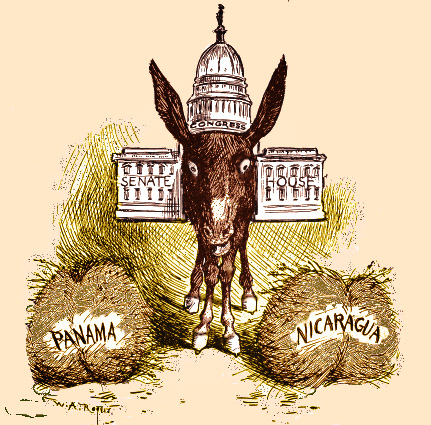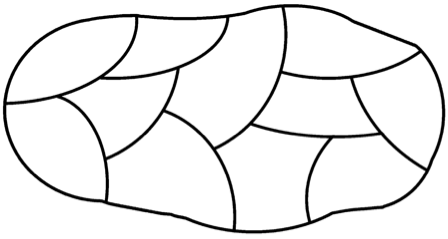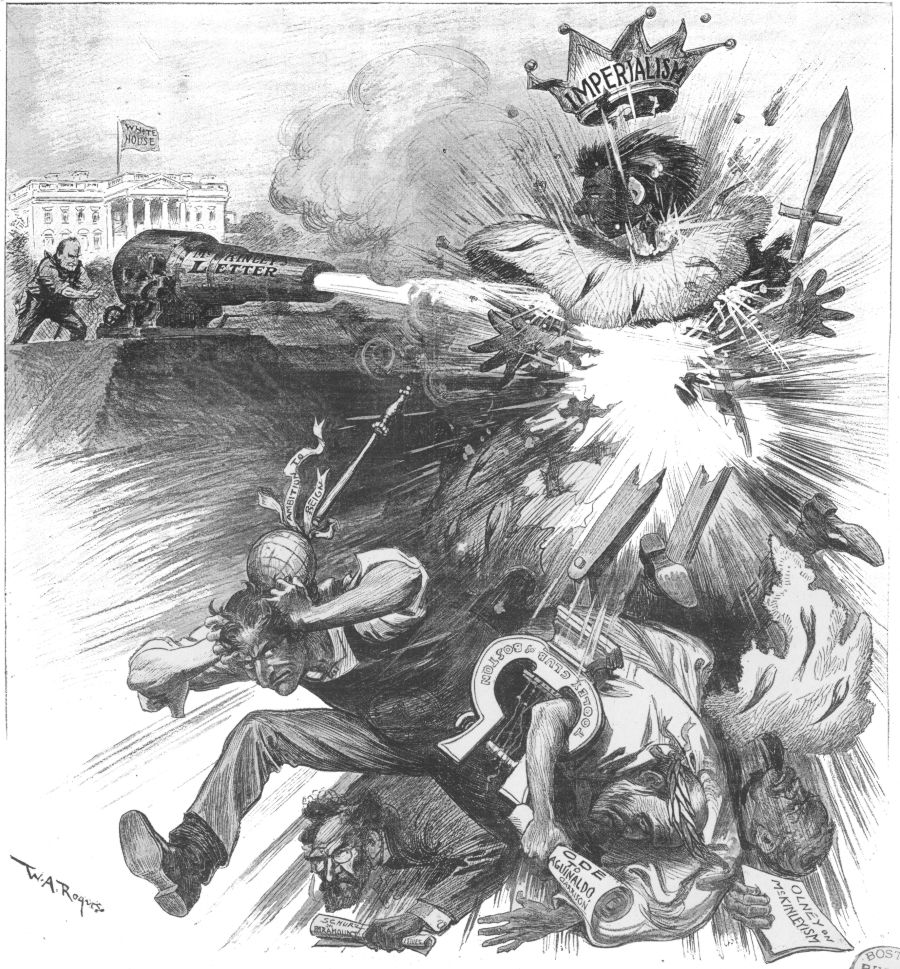|
Buridan's Ass
Buridan's ass is an illustration of a paradox in philosophy in the conception of free will. It refers to a hypothetical situation wherein an ass (donkey) that is equally hungry and thirsty is placed precisely midway between a stack of hay and a pail of water. Since the paradox assumes the donkey will always go to whichever is closer, it dies of both hunger and thirst since it cannot make any rational decision between the hay and water. A common variant of the paradox substitutes two identical piles of hay for the hay and water; the ass, unable to choose between the two, dies of hunger. The paradox is named after the 14th-century French philosopher Jean Buridan, whose philosophy of moral determinism it satirizes. Although the illustration is named after Buridan, philosophers have discussed the concept before him, notably Aristotle, who put forward the example of a man equally hungry and thirsty, and Al-Ghazali, who used a man faced with the choice of equally good dates. A ver ... [...More Info...] [...Related Items...] OR: [Wikipedia] [Google] [Baidu] |
Deliberations Of Congress
Deliberation is a process of thoughtfully weighing options, usually prior to voting. Deliberation emphasizes the use of logic and reason as opposed to power-struggle, creativity, or dialogue. Group decisions are generally made after deliberation through a vote or consensus of those involved. In legal settings a jury famously uses deliberation because it is given specific options, like guilty or not guilty, along with information and arguments to evaluate. In " deliberative democracy", the aim is for both elected officials and the general public to use deliberation rather than power-struggle as the basis for their vote. Trial juries In countries with a jury system, the jury's deliberation in criminal matters can involve both rendering a verdict and determining the appropriate sentence. In civil cases, the jury decision is whether to agree with the plaintiff or the defendant and rendering a resolution binding actions by the parties based on the results of the trial. Typica ... [...More Info...] [...Related Items...] OR: [Wikipedia] [Google] [Baidu] |
Donkey
The domestic donkey is a hoofed mammal in the family Equidae, the same family as the horse. It derives from the African wild ass, ''Equus africanus'', and may be classified either as a subspecies thereof, ''Equus africanus asinus'', or as a separate species, ''Equus asinus''. It was domesticated in Africa some years ago, and has been used mainly as a working animal since that time. There are more than 40 million donkeys in the world, mostly in underdeveloped countries, where they are used principally as draught or pack animals. While working donkeys are often associated with those living at or below subsistence, small numbers of donkeys or asses are kept for breeding or as pets in developed countries. A male donkey is known as a ''jack'' or ''jackass'', a female is a ''jenny'' or ''jennet'', and an immature donkey of either sex is a ''foal''. Jacks are often mated with female horses (mares) to produce '' mules''; the less common hybrid of a male horse (stallion) and ... [...More Info...] [...Related Items...] OR: [Wikipedia] [Google] [Baidu] |
Leslie Lamport
Leslie B. Lamport (born February 7, 1941 in Brooklyn) is an American computer scientist and mathematician. Lamport is best known for his seminal work in distributed systems, and as the initial developer of the document preparation system LaTeX and the author of its first manual. Lamport was the winner of the 2013 Turing Award for imposing clear, well-defined coherence on the seemingly chaotic behavior of distributed computing systems, in which several autonomous computers communicate with each other by passing messages. He devised important algorithms and developed formal modeling and verification protocols that improve the quality of real distributed systems. These contributions have resulted in improved correctness, performance, and reliability of computer systems. Early life and education Lamport was born into a Jewish family in Brooklyn, New York, the son of Benjamin and Hannah Lamport (née Lasser). His father was an immigrant from Volkovisk in the Russian Empire (now Vawk ... [...More Info...] [...Related Items...] OR: [Wikipedia] [Google] [Baidu] |
Field Theory (psychology)
Field theory is a psychological theory (more precisely: Topological and vector psychology) which examines patterns of interaction between the individual and the total field, or environment. The concept first made its appearance in psychology with roots to the holistic perspective of Gestalt theories. It was developed by Kurt Lewin, a Gestalt psychologist, in the 1940s. Lewin's field theory can be expressed by a formula: B = f(p,e), meaning that behavior (B) is a function of the person (p) and their cultural environment (e). History Early philosophers believed the body to have a rational, inner nature that helped guide our thoughts and bodies. This intuitive force, our soul, was viewed as having supreme control over our entire being. However, this view changed during the intellectual revolution of the 17th century. The mind versus the body was a forever evolving concept that received great attention from the likes of Descartes, Locke and Kant. From once believing that the mi ... [...More Info...] [...Related Items...] OR: [Wikipedia] [Google] [Baidu] |
Noesis
Noesis is a philosophical term, referring to the activity of the intellect or nous. Noesis may also refer to: Philosophy * Noesis (phenomenology), technical term in the Brentano–Husserl "philosophy of intentionality" tradition * Noetics, a branch of metaphysical philosophy concerned with the study of mind and intellect Music * ''Noesis'', a 2001–2003 composition by Hanspeter Kyburz * ''Noesis'', a 2005 concerto by Erkki-Sven Tüür * "Noesis", a 2005 song by Gackt from '' Diabolos'' * Noesis, American rapper who fronts the group Philadelphia Slick Other uses * ''Noesis'' (online journal), a search engine and open-access journal for academic philosophy * Noesis (software), for viewing, converting, and reverse engineering data. * Noesis Cultural Society, a Romanian cultural organization * Thessaloniki Science Center and Technology Museum or NOESIS * ''Noesis'', the journal of the Mega Society The Mega Society is a high IQ society open to people who have scored at the o ... [...More Info...] [...Related Items...] OR: [Wikipedia] [Google] [Baidu] |
Faith
Faith, derived from Latin ''fides'' and Old French ''feid'', is confidence or trust in a person, thing, or In the context of religion, one can define faith as " belief in God or in the doctrines or teachings of religion". Religious people often think of faith as confidence based on a perceived degree of warrant, or evidence while others who are more skeptical of religion tend to think of faith as simply belief without evidence.Russell, Bertrand"Will Religious Faith Cure Our Troubles?" ''Human Society in Ethics and Politics''. Ch 7. Pt 2. Retrieved 16 August 2009. Etymology The English word ''faith'' is thought to date from 1200 to 1250, from the Middle English ''feith'', via Anglo-French ''fed'', Old French ''feid'', ''feit'' from Latin ''fidem'', accusative of ''fidēs'' (trust), akin to ''fīdere'' (to trust). Stages of faith development James W. Fowler (1940–2015) proposes a series of stages of faith-development (or spiritual development) across the human lifes ... [...More Info...] [...Related Items...] OR: [Wikipedia] [Google] [Baidu] |
Randomness
In common usage, randomness is the apparent or actual lack of pattern or predictability in events. A random sequence of events, symbols or steps often has no order and does not follow an intelligible pattern or combination. Individual random events are, by definition, unpredictable, but if the probability distribution is known, the frequency of different outcomes over repeated events (or "trials") is predictable.Strictly speaking, the frequency of an outcome will converge almost surely to a predictable value as the number of trials becomes arbitrarily large. Non-convergence or convergence to a different value is possible, but has probability zero. For example, when throwing two dice, the outcome of any particular roll is unpredictable, but a sum of 7 will tend to occur twice as often as 4. In this view, randomness is not haphazardness; it is a measure of uncertainty of an outcome. Randomness applies to concepts of chance, probability, and information entropy. The fields o ... [...More Info...] [...Related Items...] OR: [Wikipedia] [Google] [Baidu] |
Straw Man
A straw man (sometimes written as strawman) is a form of argument and an informal fallacy of having the impression of refuting an argument, whereas the real subject of the argument was not addressed or refuted, but instead replaced with a false one. One who engages in this fallacy is said to be "attacking a straw man". The typical straw man argument creates the illusion of having refuted or defeated an opponent's proposition through the covert replacement of it with a different proposition (i.e., "stand up a straw man") and the subsequent refutation of that false argument ("knock down a straw man") instead of the opponent's proposition. Straw man arguments have been used throughout history in polemical debate, particularly regarding highly charged emotional subjects. Straw man tactics in the United Kingdom may also be known as an Aunt Sally, after a pub game of the same name, where patrons throw sticks or battens at a post to knock off a skittle balanced on top. Structure Th ... [...More Info...] [...Related Items...] OR: [Wikipedia] [Google] [Baidu] |
Rationality
Rationality is the quality of being guided by or based on reasons. In this regard, a person acts rationally if they have a good reason for what they do or a belief is rational if it is based on strong evidence. This quality can apply to an ability, as in rational animal, to a psychological process, like reasoning, to mental states, such as beliefs and intentions, or to persons who possess these other forms of rationality. A thing that lacks rationality is either ''arational'', if it is outside the domain of rational evaluation, or '' irrational'', if it belongs to this domain but does not fulfill its standards. There are many discussions about the essential features shared by all forms of rationality. According to reason-responsiveness accounts, to be rational is to be responsive to reasons. For example, dark clouds are a reason for taking an umbrella, which is why it is rational for an agent to do so in response. An important rival to this approach are coherence-based ac ... [...More Info...] [...Related Items...] OR: [Wikipedia] [Google] [Baidu] |
Scholium
Scholia (singular scholium or scholion, from grc, σχόλιον, "comment, interpretation") are grammatical, critical, or explanatory comments – original or copied from prior commentaries – which are inserted in the margin of the manuscript of ancient authors, as glosses. One who writes scholia is a scholiast. The earliest attested use of the word dates to the 1st century BC. History Ancient scholia are important sources of information about many aspects of the ancient world, especially ancient literary history. The earliest scholia, usually anonymous, date to the 5th or 4th century BC (such as the ''scholia minora'' to the ''Iliad''). The practice of compiling scholia continued to late Byzantine times, outstanding examples being Archbishop Eustathius' massive commentaries to Homer in the 12th century and the ''scholia recentiora'' of Thomas Magister, Demetrius Triclinius and Manuel Moschopoulos in the 14th. Scholia were altered by successive copyists ... [...More Info...] [...Related Items...] OR: [Wikipedia] [Google] [Baidu] |
Baruch Spinoza
Baruch (de) Spinoza (born Bento de Espinosa; later as an author and a correspondent ''Benedictus de Spinoza'', anglicized to ''Benedict de Spinoza''; 24 November 1632 – 21 February 1677) was a Dutch philosopher of Portuguese-Jewish origin, born in Amsterdam. One of the foremost exponents of 17th-century Rationalism and one of the early and seminal thinkers of the Enlightenment and modern biblical criticism including modern conceptions of the self and the universe, he came to be considered "one of the most important philosophers—and certainly the most radical—of the early modern period." Inspired by Stoicism, Jewish Rationalism, Machiavelli, Hobbes, Descartes, and a variety of heterodox religious thinkers of his day, Spinoza became a leading philosophical figure during the Dutch Golden Age. Spinoza's given name, which means "Blessed", varies among different languages. In Hebrew, his full name is written . In most of the documents and records contemporary with Spinoza ... [...More Info...] [...Related Items...] OR: [Wikipedia] [Google] [Baidu] |
Benedict De Spinoza
Baruch (de) Spinoza (born Bento de Espinosa; later as an author and a correspondent ''Benedictus de Spinoza'', anglicized to ''Benedict de Spinoza''; 24 November 1632 – 21 February 1677) was a Dutch philosopher of Portuguese-Jewish origin, born in Amsterdam. One of the foremost exponents of 17th-century Rationalism and one of the early and seminal thinkers of the Enlightenment and modern biblical criticism including modern conceptions of the self and the universe, he came to be considered "one of the most important philosophers—and certainly the most radical—of the early modern period." Inspired by Stoicism, Jewish Rationalism, Machiavelli, Hobbes, Descartes, and a variety of heterodox religious thinkers of his day, Spinoza became a leading philosophical figure during the Dutch Golden Age. Spinoza's given name, which means "Blessed", varies among different languages. In Hebrew, his full name is written . In most of the documents and records contemporary with Spinoza ... [...More Info...] [...Related Items...] OR: [Wikipedia] [Google] [Baidu] |








